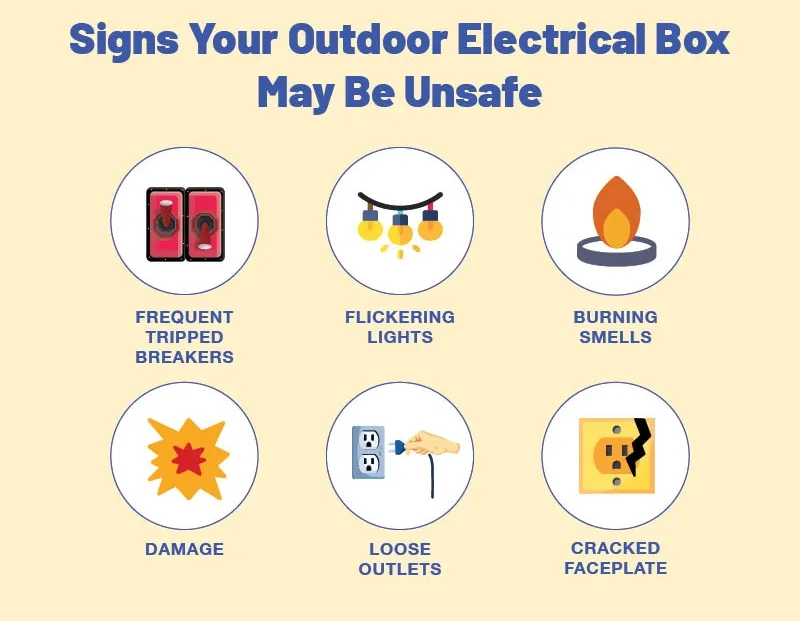Understanding the Potential Dangers of Outdoor Electrical Boxes
Outdoor electrical boxes are crucial for providing electricity to homes and businesses through underground conduits, while overhead power lines deliver electricity from above. These boxes are accessible to the public, which increases the likelihood of accidents if safety measures are not observed, particularly in the presence of water or when foreign objects are inserted into the box.
Some of the risks associated with outdoor electrical boxes include:
- Burns, shocks, and electrocution: These dangers arise when someone interacts with an outdoor electrical box without proper expertise or when the area is wet, increasing the risk of electrical accidents.
- Electrical faults and fires: Water exposure can lead to short circuits or arc faults, creating hazardous conditions. If flammable materials are stored near faulty components, an electrical arc could ignite them, potentially causing fires.
- Weather-related deterioration: Prolonged exposure to outdoor elements causes electrical components to degrade, heightening the chance of electric shock over time.
- Accumulation of debris: Dust, dirt, insects, and small animals can infiltrate and damage outdoor electrical boxes if they are not adequately protected.
- Circuit overloads: Excessive use of outdoor appliances or lighting fixtures may strain circuits, leading to overheating and potential hazards.
- Damaged or faulty outlets: Unnoticed or neglected damage to outdoor outlets is a common cause of fires and electrocution incidents.
Signs Your Outdoor Electrical Box May Be Unsafe
Identifying potential hazards in your outdoor electrical box is essential for maintaining safety. Below are some common indicators that your electrical box may be unsafe:
- Frequent breaker trips: If circuit breakers trip repeatedly, it could indicate an overloaded circuit or a malfunctioning or outdated breaker box.
- Flickering or dimming lights: Outdoor lights that flicker or dim, especially when appliances are turned on or off, often signal an underlying electrical problem that requires attention.
- Burning odors: A noticeable burning smell coming from the breaker box is a serious warning sign of an electrical system malfunction.
- Visible damage: Signs of rust, corrosion, or burn marks on the electrical box suggest damage that should be addressed by a qualified electrician immediately.
- Loose outlets: Outlets that are not securely fastened can lead to wiring issues, increasing the risk of fire.
- Cracked faceplates: A damaged faceplate exposes internal wiring, creating a significant fire hazard and requiring prompt repair.
By addressing these issues promptly, you can prevent potential accidents and ensure the safety of your outdoor electrical system.

Essential Safety Measures for Outdoor Electrical Boxes
Outdoor switches and outlets are usually housed in small boxes mounted on the exterior walls of homes. While these outdoor electrical systems are generally as safe as indoor ones, it’s important to follow specific safety practices to ensure their proper use and maintenance.
Weatherproofing
Using weatherproof covers and enclosures is essential to shield your electrical box from the elements. Corrosion-resistant components enhance durability and reduce the risk of electrical shocks. Weather-resistant receptacles are ideal because they can withstand rain, snow, ice, and humidity.
Always choose weatherproof electrical boxes and outlets with protective covers. Keep the cover closed when the outlet is not in use, and simply flip it open when you need to plug something in.
Install GFCI Outlets
Ground Fault Circuit Interrupter (GFCI) outlets are a must for outdoor electrical systems. These outlets automatically shut off power if a ground fault is detected, preventing electricity from sparking and reducing the risk of harm to people, pets, or nearby conductive materials.
Avoid Extension Cords Outdoors
Refrain from using extension cords outside, especially those designed for indoor use. Indoor cords are not built to handle outdoor conditions or provide sufficient power for heavy-duty tools and equipment. Using the wrong type of cord can lead to overheating, electrical hazards, or damage to your devices.
Prevent Overloaded Circuits
Outdoor outlets are often limited in number, so avoid plugging multiple devices into a single outlet. Overloading circuits can lead to overheating, fires, or other electrical issues. Additionally, extension cords increase the risk of overloading and create trip hazards in outdoor spaces.
Keep Water Away
Never place electrical boxes or outlets near water sources such as pools, ponds, fountains, or areas prone to flooding. Water and electricity are a dangerous combination that can lead to severe accidents or injuries.
Maintain a Clear Area
Ensure that outdoor electrical outlets remain unobstructed at all times. Avoid blocking them with trash, firewood piles, boxes, shrubs, or trees. Keeping the area clear allows for safe access and reduces potential hazards.
When to Call an Electrician
How do you know it’s time to call an electrician regarding the safety of your outdoor electrical box? A licensed electrician can ensure that your outdoor electrical connections are secure and that the correct switches and outlets are in use.
Be on the lookout for warning signs such as sparking, buzzing sounds, flickering lights, a burning odor, or an outdoor electrical outlet that feels unusually warm. If you notice any of these issues, it’s crucial to reach out to a professional electrician without delay.
